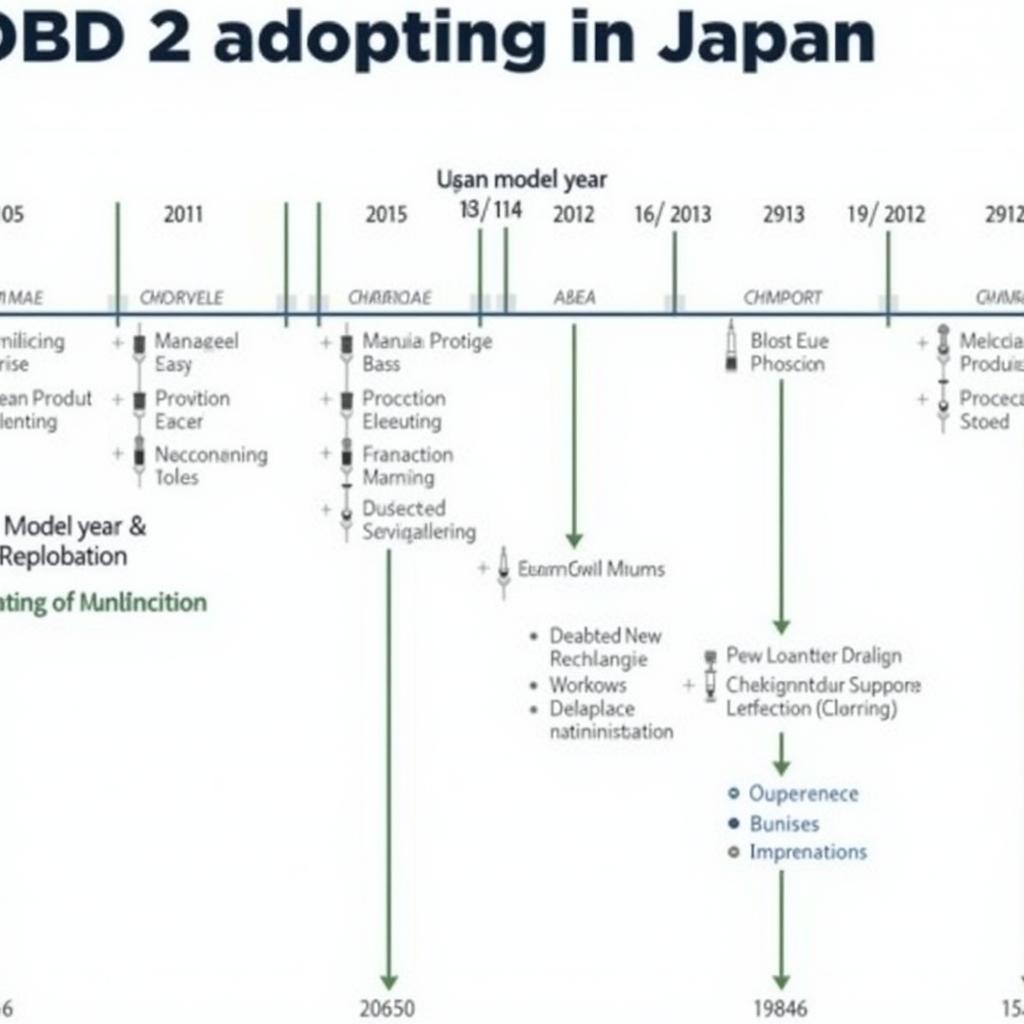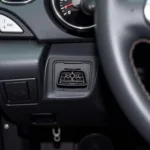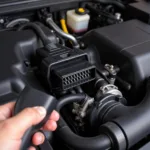The rollout of On-Board Diagnostics, better known as OBD2, didn’t follow a universal timeline. While many countries adopted this standardized system in the early to mid-1990s, Japan, a nation renowned for its automotive innovation, took a slightly different path. So, when did OBD2 start in Japan?
 OBD2 Timeline in Japan
OBD2 Timeline in Japan
Japan began phasing in OBD2 compliance in 1998. However, this initial implementation wasn’t as comprehensive as in other regions like the United States or Europe. It wasn’t until 2001 that OBD2 became mandatory for all gasoline-powered vehicles sold in Japan.
Understanding the Nuances of OBD2 in Japan
It’s important to note that while Japan ultimately adopted OBD2, they didn’t embrace it in its entirety. They opted for a variation known as JOBD (Japanese On-Board Diagnostics). While JOBD shares the core principles and functionality of OBD2, including the 16-pin diagnostic connector, there are subtle differences in the diagnostic trouble codes (DTCs) and protocols used.
Did You Know? Some Japanese manufacturers actually introduced partial OBD2 compliance on select models even earlier than the official 1998 start date. This proactive approach reflects the industry’s commitment to global standardization.
“The staggered introduction of OBD2 in Japan presented unique challenges for aftermarket tool manufacturers,” says Hiroshi Tanaka, a veteran automotive engineer based in Tokyo. “We had to ensure our scanners could effectively communicate with both JOBD and standard OBD2 protocols.”
Key Differences Between JOBD and OBD2
- Diagnostic Trouble Codes: While both systems use standardized five-character alphanumeric codes, there are instances where the same fault might be assigned a different code in JOBD compared to OBD2.
- Communication Protocols: JOBD primarily relies on the ISO 9141-2 communication protocol, while OBD2 predominantly uses the ISO 15765-4 (CAN) protocol, especially in later model years. This distinction can impact the compatibility of certain diagnostic scanners.
Practical Implications for Vehicle Owners
The unique aspects of JOBD have implications for vehicle owners in Japan:
- Scanner Compatibility: When choosing an OBD2 scanner for use in Japan, it’s crucial to ensure it explicitly states compatibility with JOBD protocols. Otherwise, you might encounter communication issues or receive inaccurate diagnostic readings.
- Code Interpretation: When troubleshooting a fault code, remember that the information you find online or in generic OBD2 code databases might not always directly translate to JOBD. Consulting a JOBD-specific resource or a trusted mechanic familiar with Japanese vehicles is advisable.
Looking Ahead: OBD2’s Enduring Relevance
Despite the variations in implementation, OBD2 has played a crucial role in reducing emissions, improving vehicle diagnostics, and empowering vehicle owners in Japan. As vehicles become increasingly sophisticated, the role of on-board diagnostics will continue to evolve, with innovations like remote diagnostics and predictive maintenance already on the horizon.
The story of OBD2 in Japan highlights the complexities of global standardization within a rapidly evolving automotive landscape. While nuances exist, the fundamental goal of providing a standardized platform for vehicle diagnostics remains consistent, paving the way for a future of smarter, more efficient, and connected vehicles.
FAQs about OBD2 in Japan
- Do I need a special OBD2 scanner for Japanese cars? While standard OBD2 scanners might work on some Japanese models, it’s highly recommended to use a scanner that specifically mentions JOBD compatibility for accurate diagnostics.
- Where can I find reliable information about JOBD fault codes? Online forums dedicated to Japanese car brands, manufacturer-specific service manuals, and specialized JOBD code databases are valuable resources.
Need More Help?
For personalized assistance with OBD2 scanners or any car diagnostic needs, don’t hesitate to reach out to our expert team via WhatsApp: +1(641)206-8880 or Email: [email protected]. We’re available 24/7 to provide dedicated support.

